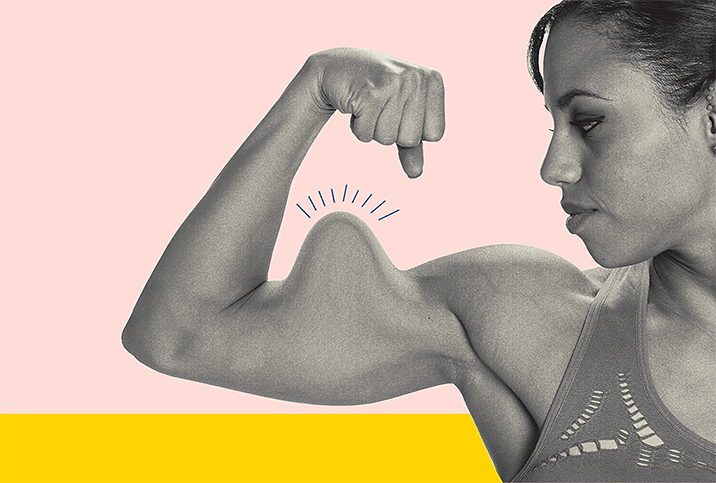The Difference Between Gaining Lean Mass and Losing Weight

When you think of getting in shape, what comes to mind? For most women, images of a smaller, tighter body likely flash in their mind's eye, perhaps accompanied by a tinge of guilt or feelings of failure for not already fitting the bill. It's less of an ideal and more of an expectation: Women often strive to lose weight, take up less space and effectively shrink themselves into a specifically acceptable shape.
What would happen if, instead of being distressed at a higher number on the scale, you felt accomplished? If instead of viewing exercise and food as conduits of deprivation, you used them as fuel to feel more powerful?
That's where bulking and muscle gain comes in.
The trouble with trying to lose weight
High-calorie burns and low-calorie consumption in the pursuit of weight loss may bring unintended consequences if done without caution.
"Long periods of calorie deficits can lead to loss of lean body mass, osteopenia or osteoporosis and dysregulated hormones," explained Brad Dieter, Ph.D. and NASM-certified nutrition coach.
Darcy Sterling, Ph.D., an NYC-based relationship therapist, sees more than just physical risk with restrictive behavior.
"If I see that someone is being very restrictive, I know it's about control, rigidity and other deeper psychological issues," Sterling said. "When people are always seeking weight loss, it can lead to a slippery slope of other issues, such as stronger insecurities, eating disorders and never feeling like they are enough. As a result, they can lose sight of overall health and happiness."
Moreover, the constant desire to form and shape your body can become obsessive, leading to permanent dissatisfaction and an out-of-touch view of your own body.
"There is a relatively high rate of body dysmorphia in the United States, with roughly 2 to 3 out of 100 women experiencing some form of clinically diagnosable body dysmorphia," Dieter said.
How intentional healthy weight gain helps
Wendy Batts, M.S., LMT, and NASM-certified personal trainer, sees a potential benefit to intentionally gaining healthy weight in the form of lean mass.
"One such benefit is improved hormonal profiles, which may lead to better sleep, increased energy and enhanced mood state, as well as increases in strength and muscle—all of which may improve self-confidence and self-image," Batts said. "This can have a profound and compounding effect on how we perceive ourselves and how others perceive us, too."
If a fit, toned form is your goal, the intentional weight gain may even help with that as well.
"Ultimately, the look or aesthetic many women are after requires some muscular development, which is attained through progressively more challenging strength training and providing the body with enough of the right nutrients and calories to support muscle tissue development," Batts said.
Learning to let your body guide you in terms of hunger and fullness instead of seeking to control your appetite (until you can't) is a game-changer.
The vast majority of dieters fail and regain any weight that has been lost. Actively fueling yourself to gain muscle and boost your performance rather than aiming to lose weight helps you become more aware of your choices overall, rather than simply eliminating food intake en masse.
Viewing food as fuel creates a relationship with eating that is supportive, helping you reach your goals and powering you through daily life. Rather than food being something to burn off, you can eat knowing your intake is supporting your physical goals.
Feeling strong, powerful and energized is a huge confidence boost.
Putting it all together
Letting go of control and cultural expectations is exceptionally challenging. But if you allow yourself to grow in lean mass, you will also grow as a person, fostering a healthier and more in-tune relationship with your body, food and exercise.


















